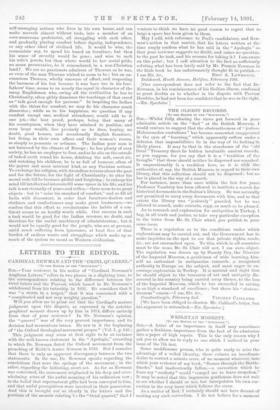LETTERS TO THE EDITOR.
CARDINAL NEWMAN AND THE "ORIEL QUARREL."
[To TEM EDITOR OF THE "SPECTATOR."
SIR,—Your reviewer, in his notice of " Cardinal Newman's Anglican Letters," refers in two places, in a slighting tone, to the correspondence relating to the difference between the Oriel tutors and the Provost, which issued in Dr. Newman's withdrawal from his tutorship in 1832. He considers that it was " a storm in a teapot," that it was concerned with a " complicated and not very weighty question."
Will you allow me to point out that the Cardinal's mature judgment upon this dispute, as expressed in the autobio- graphical memoir drawn up by him in 1874, differs entirely from that of your reviewer P In Dr. Newman's opinion, the "quarrel" was of the very gravest importance, and its decision had momentous issues. He saw in it the beginning of "the Oxford theological movement proper." (Vol. I., p. 148.)
This judgment may seem at first sight to be at variance with the well-known statement in the " Apologia," according to which Dr. Newman dated the Oxford movement from the preaching of Keble's Assize Sermon in 1833. But I conceive that there is only an apparent discrepancy between the two statements. In the one, Dr. Newman speaks regarding the convictions that were the springs of the movement ; in the other, regarding the initiating, overt act. As far as Newman was concerned, the movement originated in his deep and over- whelming sense of the awful meaning of his ordination vow ; in the belief that supernatural gifts had been conveyed to him, and that awful prerogatives were involved in their possession. And this is brought out so clearly in the letters and the portions of the memoir relating to the "Oriel quarrel," that I
venture to think we have no good reason to regret that so- large a space has been given to them.
May I add, with reference to Peel's candidature, and New- man's action in that matter, that his letters written at the time amply confirm what be has said in the "Apologia" as- that your reviewer suggests no doubt, and raises no question,. to the part he took, and his reasons for taking it P I am aware• on this point ; but I call attention to the fact as sufficiently refuting what has been lately said by Mr. Francis Newman in the little book he has unfortunately thought fit to publish.—.
[Our correspondent does not refer to the fact that Dr•• Newman, in his reminiscences of his Sicilian illness, confessed to great doubts as to whether in his dispute with Provost. Hawkins, he had not been too confident that he was in the right.. —En. Spectator ]


































 Previous page
Previous page